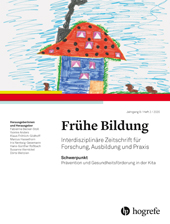Zur gesundheitlichen Lage von Kindern im Kita-Alter in Deutschland
Ergebnisse der KiGGS-Studie
Abstract
Zusammenfassung. Kindertageseinrichtungen (Kitas) sind das zentrale Setting für Gesundheitsförderung und Prävention bei Kindern im Vorschulalter. Der Erziehungs- und Bildungsauftrag der Kita umfasst auch gesundheitliche Aspekte. Der Beitrag zeigt ausgewählte Ergebnisse zum Gesundheitszustand und dem Gesundheitsverhalten von Kindern im Alter bis zu 6 Jahren, die auf aktuellen bundesweit repräsentativen Daten der „Studie zur Gesundheit von Kindern und Jugendlichen in Deutschland (KiGGS)“ basieren. Die große Mehrheit der Kinder wächst gesund auf, allerdings zeigen sich deutliche Handlungsbedarfe für Gesundheitsaspekte im Bereich von Ernährung, Bewegung und der psychischen Gesundheit. Das Ausmaß der Bedarfe ist abhängig vom sozioökonomischen Status der Familien. Der frühen Bildung im Setting Kita kommt eine bedeutsame Rolle zu, da hier Kinder unabhängig von ihrem familiären Hintergrund erreicht werden können. Dies kann dazu beitragen, das Präventionspotenzial im Hinblick auf die Reduzierung von Gesundheitsproblemen wie Adipositas oder psychischen Auffälligkeiten weiter auszuschöpfen.
Abstract. Childcare centres are the central setting for health promotion and prevention in preschool children. The educational mandate also includes health aspects. The article shows selected results on the health status and health behaviour of children aged up to 6 years based on current nationwide representative data from the “German Health Interview and Examination Survey for Children and Adolescents (KiGGS)”. The majority of children grow up healthy, but there is a need for action on health aspects in the areas of nutrition, physical activity and mental health. The extent of the needs depends on the socioeconomic status of the families. Early education in the childcare centre setting plays an important role, as children can be reached here regardless of their family background. This can contribute to take further advantage of the prevention potential of early childcare with regard to reducing health problems like obesity or mental health problems.
Literatur
(2008). Die Ernährung gesunder Kinder und Jugendlicher nach dem Konzept der Optimierten Mischkost. Ernährungs Umschau , 38 , 168–177.
Bundesministerium für Familie, Senioren, Frauen und Jugend (BMFSFJ) (Hrsg.). (2009). 13. Kinder- und Jugendbericht. Bericht über die Lebenssituation junger Menschen und die Leistungen der Kinder- und Jugendhilfe in Deutschland (2. Aufl.). Berlin: BMFSFJ.Bundesministerium für Gesundheit (Hrsg.). (2010). Nationales Gesundheitsziel „Gesund aufwachsen: Lebenskompetenz, Bewegung, Ernährung“ . Berlin: BMG.Bundeszentrale für gesundheitliche Aufklärung (Hrsg.). (2013). Kooperationsverbund Gesundheitliche Chancengleichheit. Kurzdarstellung . Verfügbar unter: https://www.gesundheitliche-chancengleichheit.de/kooperationsverbund/struktur/(2016). Gesundheitsförderung im Setting Kita. Ausgangslage und Perspektiven durch das Präventionsgesetz. Prävention und Gesundheitsförderung , 4 , 230–236.
(1997). The Strengths and Difficulties Questionnaire: a research note. Journal of child psychology and psychiatry , 38 , 581–586.
(2018). Querschnitterhebung von KiGGS Welle 2 – Teilnehmendengewinnung, Response und Repräsentativität. Journal of Health Monitoring , 3 (1), 82–96.
(2014). Psychische Auffälligkeiten und psychosoziale Beeinträchtigungen bei Kindern und Jugendlichen im Alter von 3 bis 17 Jahren in Deutschland – Prävalenz und zeitliche Trends zu 2 Erhebungszeitpunkten (2003–2006 und 2009–2012). Bundesgesundheitsblatt – Gesundheitsforschung – Gesundheitsschutz , 57 , 807–819.
Jugendministerkonferenz & Kultusministerkonferenz (2012). Gemeinsamer Rahmen der Länder für die frühe Bildung in Kindertageseinrichtungen. Beschluss der Jugendministerkonferenz vom 13./14.05.2004. Beschluss der Kultusministerkonferenz vom 03./04.06.2004. Verfügbar unter: http://www.kmk.org/fileadmin/pdf/PresseUndAktuelles/2004/Gemeinsamer_Rahmen_Kindertageseinrich_BSJMK_KMK.pdf [Zugriff: 06.07.2015].(2018). Psychische Auffälligkeiten bei Kindern und Jugendlichen in Deutschland – Querschnittergebnisse aus KiGGS Welle 2 und Trends. Journal of Health Monitoring , 3 (3). Verfügbar unter: https://edoc.rki.de/handle/176904/5767 [Zugriff: 24.09.2018].
(2001). Perzentile für den Body-Mass-Index für das Kindes- und Jugendalter unter Heranziehung verschiedener deutscher Stichproben. Monatsschrift Kinderheilkunde , 149 , 807–818.
(2018). Sport- und Ernährungsverhalten bei Kindern und Jugendlichen in Deutschland – Querschnittergebnisse aus KiGGS Welle 2 und Trends. Journal of Health Monitoring , 3 (2), 3–22.
(2016). Soziale Determinanten der Schwimmfähigkeit von Kindern und Jugendlichen in Deutschland. Ergebnisse aus KiGGS Welle 1. Deutsche Zeitschrift für Sportmedizin , 67 (6), 137–143.
(2016). Strategien des Robert Koch-Instituts zum Monitoring der Gesundheit von in Deutschland lebenden Kindern und Jugendlichen. Kinder- und Jugendmedizin , 16 , 176–183.
(2008). The challenge of comprehensively mapping children‘s health in a nation-wide health survey: Design of the German KiGGS-Study. BMC Public Health , 8 (1), 196.
(2007). Die Verbreitung von Übergewicht und Adipositas bei Kindern und Jugendlichen in Deutschland. Ergebnisse des bundesweiten Kinder- und Jugendgesundheitssurveys (KiGGS). Bundesgesundheitsblatt Gesundheitsforschung Gesundheitsschutz , 50 , 736–743.
(2010). Frühe Weichenstellung. Zur Bedeutung der Kindheit und Jugend für die Gesundheit im späteren Leben. Bundesgesundheitsblatt Gesundheitsforschung Gesundheitsschutz , 53 , 486–497.
(2014). Die KiGGS-Folgebefragung (KiGGS Welle 1). Feldarbeit, Stichprobendesign, Response, Gewichtung und Repräsentativität. Bundesgesundheitsblatt – Gesundheitsforschung – Gesundheitsschutz , 57 , 747–761.
(2018). Längsschnitterhebung von KiGGS Welle 2 – Erhebungsdesign und Fallzahlentwicklung der KiGGS-Kohorte. Journal of Health Monitoring , 3 (1). Verfügbar unter: http://www.rki.de/journalhealthmonitoring
(2017). Neue Daten für Taten. Die Datenerhebung der KiGGS Welle 2 ist beendet. Journal of Health Monitoring , 2 (3), 2–27.
(2004). Was isst du? Ein Verzehrshäufigkeitsfragebogen für Kinder und Jugendliche. Bundesgesundheitsblatt Gesundheitsforschung Gesundheitsschutz , 47 , 219–226.
Präventionsgesetz (2015). Gesetz zur Stärkung der Gesundheitsförderung und der Prävention (Präventionsgesetz – PrävG). Bundesgesetzblatt Teil I Nr 31 vom 24.07.2015 , 1368–1379.(2016). Nationale Empfehlungen für Bewegung und Bewegungsförderung . Erlangen-Nürnberg: FAU.
(2018a). Übergewicht und Adipositas im Kindes- und Jugendalter in Deutschland – Querschnittergebnisse aus KiGGS Welle 2 und Trends. Journal of Health Monitoring , 3 (1), 16–23.
(2018b). Entwicklung von Übergewicht und Adipositas bei Kindern – Ergebnisse der KiGGS-Kohorte. Journal of Health Monitoring , 3 (1), 76–81.
(2004). Neue Morbidität im Kindesalter – Aufgaben für die Sozialpädiatrie. Kinderärztliche Praxis , 75 , 292–299.
(2018). Der Kindergarten und seine Bedeutung für die Gesundheit unserer Kinder. Forschungsstand – Forschungslücken – Forschungsagenda. unsere jugend , 70 , 491–499.
Statistisches Bundesamt (2018). Betreuungsquote zum 15.03.2018 . Verfügbar unter: https://www.destatis.de/DE/ZahlenFakten/GesellschaftStaat/Soziales/Sozialleistungen/Kindertagesbetreuung/Tabellen/Tabellen_Betreuungsquote.html(2016). Gute gesunde Kita. Bildung und Gesundheit in Kindertageseinrichtungen . Berlin: das netz.
(2004). Normative data and scale properties of the German parent SDQ. European Child & Adolescent Psychiatry , 13 (2), ii3–ii10.
World Health Organisation (2010). Global Recommendations on physical activity for health . Geneva, Switzerland: WHO.



